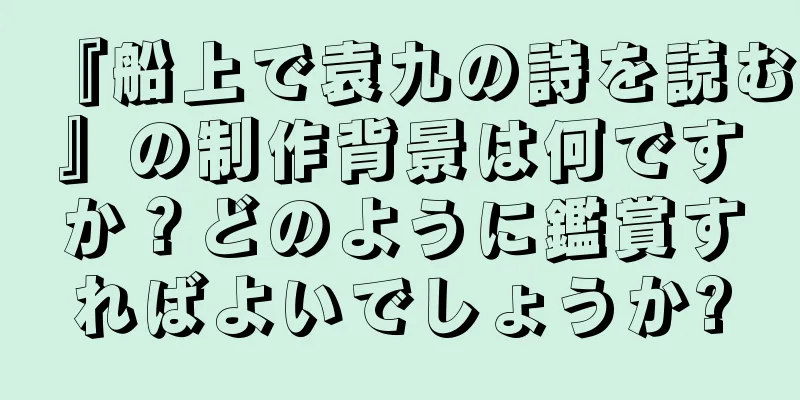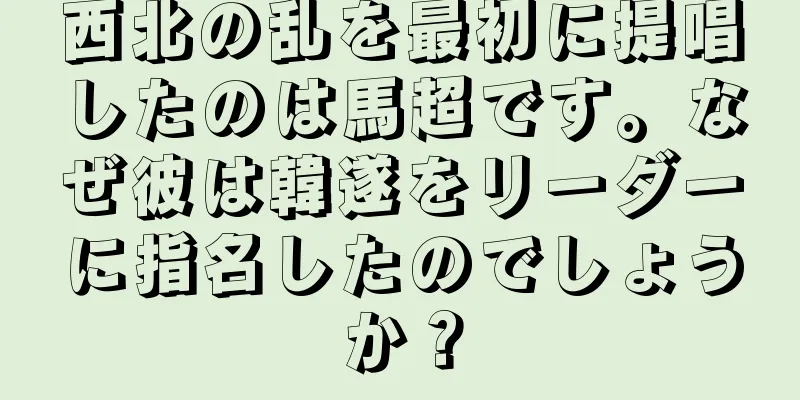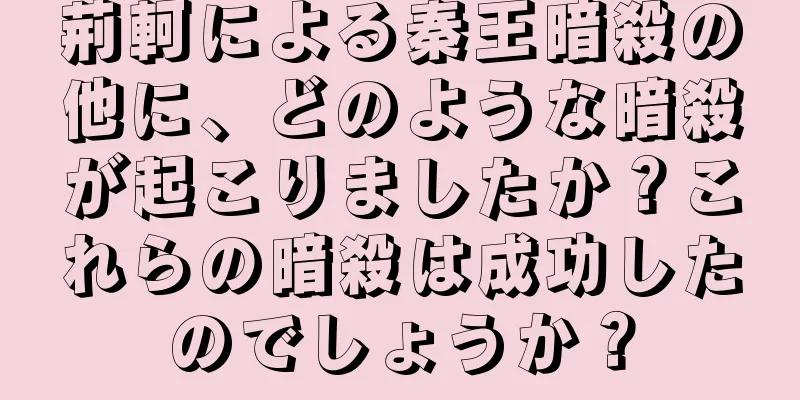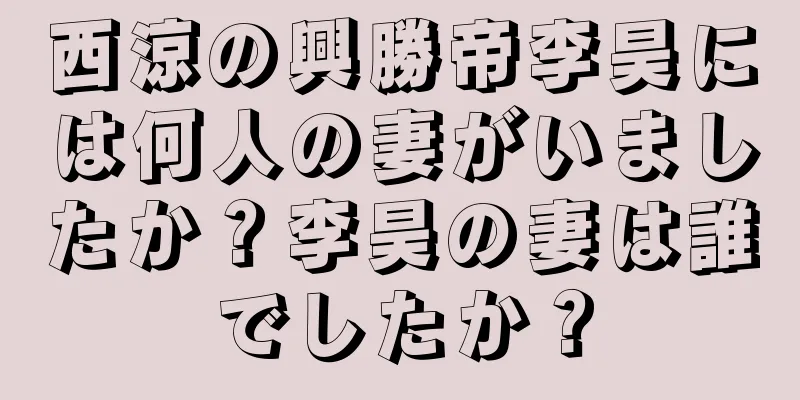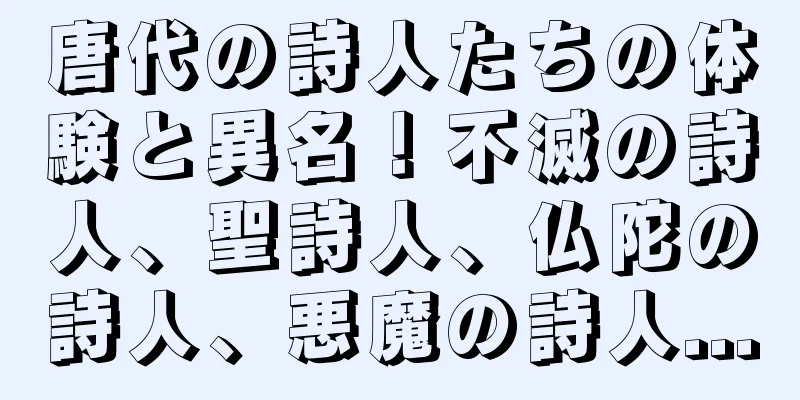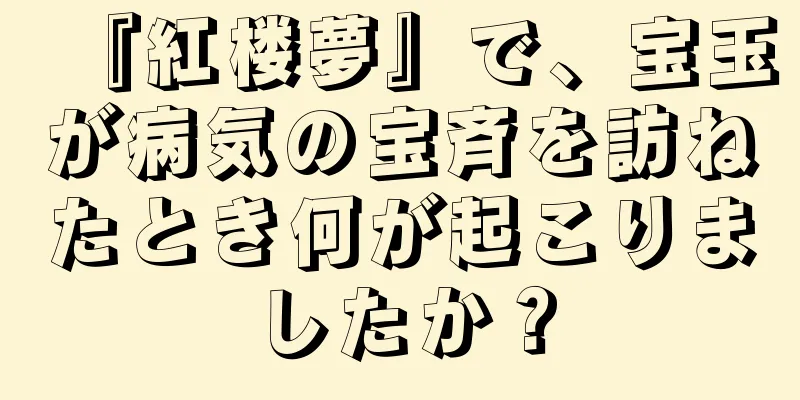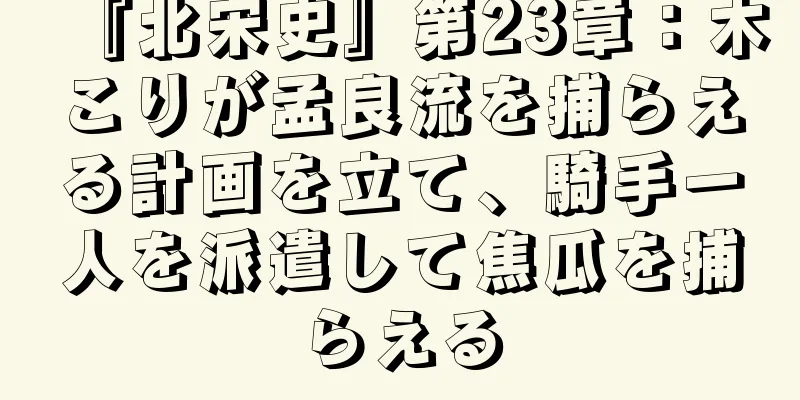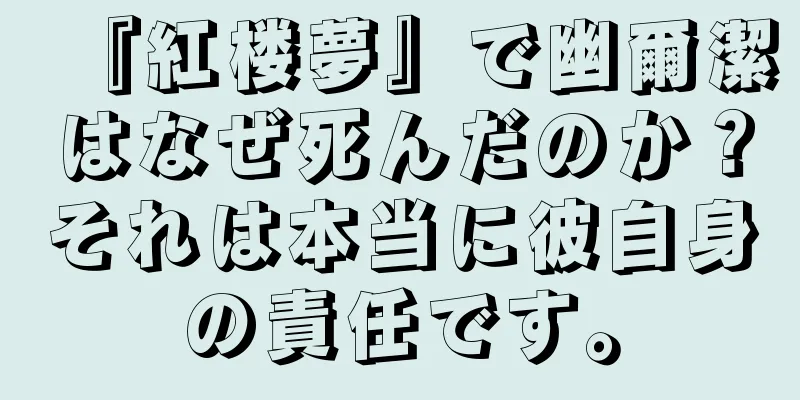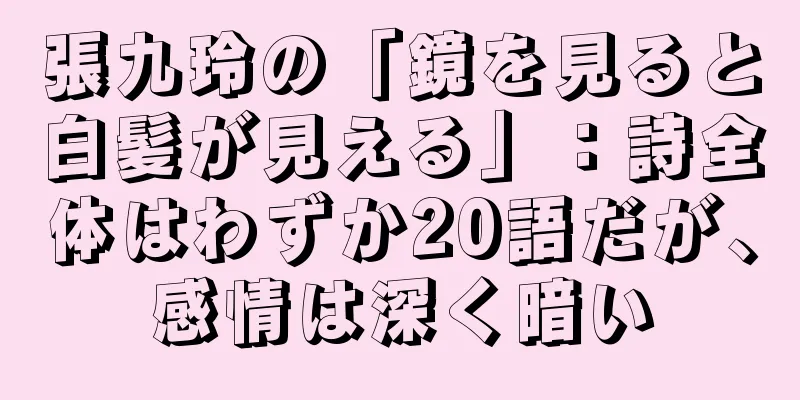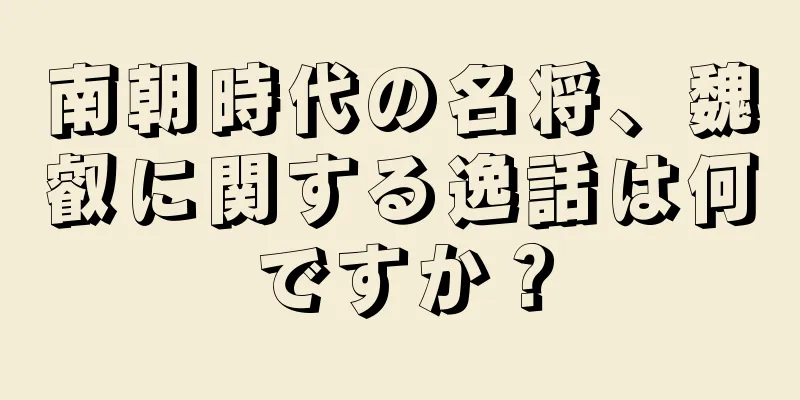北京語:周瑜・善穆公が景王に大鐘を鋳造するよう助言する(全文と翻訳注釈)
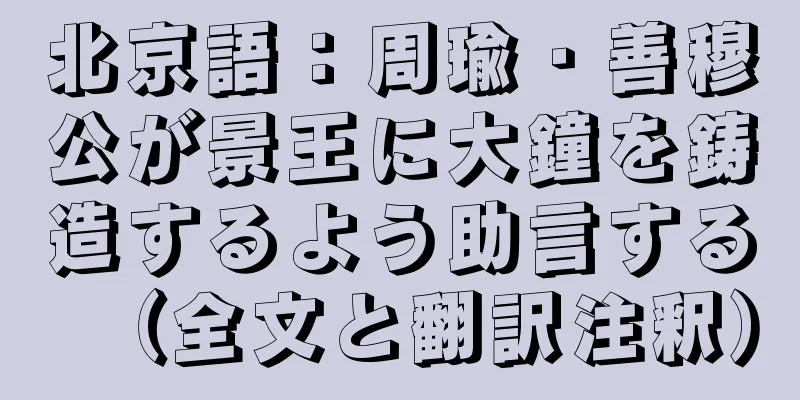
|
『国語』は中国最古の国書である。周王朝の王族と魯、斉、晋、鄭、楚、呉、越などの属国の歴史が記録されています。それは周の穆王12年(紀元前990年)に西方の泉容(紀元前947年頃)に対する遠征を開始したときに始まり、芝伯の破壊(紀元前453年)で終わりました。宮廷訪問、宴会での演説、風刺、討論、各国の貴族間の応答、そしていくつかの歴史的出来事や伝説が含まれています。次に、興味深い歴史編集者が、周瑜山慕公が景王に大きな鐘を鋳造するよう助言したことについて詳しく紹介します。見てみましょう。 23年目に、王は霧社を鋳造して大きな森にしようとしていました。 Duke Shan Mu said, "No. Make heavy coins to cut off the people's resources, and cast big bells to make them scarce. If the accumulation of wealth is lost and the accumulation of wealth is scarce, how can people reproduce? Moreover, the bell is nothing more than a moving sound. If there is no archery but a forest, the ears cannot reach it. The sound of the bell is for the ears. What the ears cannot reach is not the sound of the bell. Just like what the eyes cannot see, it cannot be seen. The eyes can only detect the distance between the footsteps and the length; the color can only detect the distance between the ink and the foot. The ears can detect harmony between clear and turbid; the clarity and turbidity can only detect the difference between one person. Therefore, the bells made by the ancient kings were no larger than the pound and no heavier than the stone. The musical scales and weights were created from this, and the small and large utensils were used from this, so the sages were careful. Now the king has made a bell, but it cannot be heard, and it cannot be compared. The sound of the bell cannot be used to know the harmony, and the system cannot be used to know the rhythm. It is useless for music and it depletes the people's wealth. What use is it!" 「楽しみは聞くこと、美しさは見ることにほかならない。音楽に衝撃を受け、美しさに目が眩んだら、これ以上の害はない。耳と目は心の鍵であるので、調和して聞き、正しく見なければならない。調和して聞くことは知性につながり、正しく見ることは明晰につながる。知性は聞くことにつながり、明晰さは徳につながる。言葉を聞き、徳を示すことは、純粋で堅固な考えにつながる。人々に徳を語れば、人々は喜び、それを称賛し、あなたに忠誠を尽くす。人々の心をつかみ、正義を修めれば、望むことをすべて行い、求めることをすべて達成できる。そうすれば、楽しむことができる。耳に調和のとれた音があり、口から美しい言葉を語り、それを法律や規則にして人々に広め、適度に矯正すれば、人々は心と力で疲れることなくあなたに従い、ためらうことなく物事を成し遂げ、楽しむことができる。耳の音は、Qiを生成します。失われた場合、それは調和していません。彼はどうして3年後に望んでいるのかを理解することはできません。 王は聞き入れず、霊州九に尋ねた。彼は答えた。「私の役所はそれほど良くはありません。琴や琴は鑼を重んじ、鐘は玉を重んじ、石は角を重んじ、瓢箪や竹は良い材料で作られていると聞きました。大きいものは鑼より大きくなく、小さいものは玉より小さくありません。鑼は音の主であり、玉は副です。賢者は音楽を大切にし、お金が大好きです。お金は楽器を準備するために使用され、音楽は富を蓄積するために使用されます。したがって、重い楽器は良い材料で作られ、軽いものは大きな材料で作られています。したがって、金は玉で作られ、石は角で作られ、瓦絹は鑼で作られ、瓢箪と竹は玉で作られ、革木は1つの音で作られています。 "Governance is like music. Music follows harmony, and harmony follows peace. Harmony is the sound, and peace is the rhythm. Metal and stone move it, silk and bamboo convey it, poetry conveys it, songs chant it, gourds spread it, tiles praise it, and leather and wood regulate it. When things are in their normal state, it is called the extreme of music. The gathering of the extreme is called sound. Harmony is the sound that responds to each other. Peace is the sound that is not excessive. In this way, it is cast in gold, ground on stone, tied on silk and wood, crossed on gourds and bamboo, and regulated by drums to make it go, so as to fulfill the eight winds. Then the air is neither stagnant in yin nor scattered in yang. Yin and yang are in order, and wind and rain come at the right time. Good things are born and flourish, people are harmonious and profitable, things are ready and music is complete, and the upper and lower do not stop. Therefore, it is called the music is right. Now, if the details exceed the master, it will hinder the right. If the things are used excessively, it will hinder the money. If the right is damaged and the money is insufficient, it will hinder the music. If the details are suppressed and the big is not tolerated, it is not harmonious. If the sound is heard farther away, it is not peaceful. If the sound is not harmonious and hinders the right and the money is insufficient, it is not the responsibility of the clan officials. 「平和の音があれば、富と繁栄がある。だから、中庸の徳で教え、中庸の音で唱えれば、徳の音は間違いがなく、神々と人々に調和する。神々は平和で、人々は耳を傾ける。もしお金を奪い、人々の力を利用して欲望にふけるなら、人々はあなたの言うことを聞かず、あなたと比較しない。それは教えに役立たず、人々を遠ざけ、神々を怒らせるだろう。私はこのようなことを聞いたことがない。」 王は聞く耳を持たず、ついに大きな鐘を投げ入れた。 24年目に鐘が完成し、役者たちは別れを告げた。王維凌州九 彼は言った、「鐘は確かに調和している」。彼は答えた、「それは分からない」。王は尋ねた、「なぜか?」彼は答えた、「皇帝が楽器を作り、民が準備してそれを使用して楽しんでいるときは調和している。今は国庫が失われ、民は疲れ果て、誰もが恨んでいる。調和しているかどうかは分からない。さらに、民が好きなものはめったに使用されず、嫌いなものはめったに放棄されない。したがって、「心が多いと要塞になり、口が多いと金が溶ける」という諺がある。3年以内に金への害が再び高まったのは、人々がそれが放棄されることを恐れているからだ。」王は言った、「あなたは年老いて痴呆症になっているのに、どうしてわかるのか?」25年目に王は亡くなり、鐘はもはや調和しなくなった。 翻訳する 23年、周の景王は霧社楽鐘を鋳造するために、まず大きな臨中楽鐘を建てることを計画しました。山沐公は言った。「いいえ。大銭を鋳造することはすでに人民の財産を奪っています。大鐘を鋳造することは人民の負担を増やすことになります。人民の貯蓄を奪い、負担を増やしたら、どうやって生きていくことができますか?鐘は音楽を奏でるためだけに使われます。無社が大林鐘のような大きな鐘を造っても、耳にはその音が聞こえません。鐘の音は耳に聞こえるためのものです。耳に聞こえなければ、それは鐘の音とはみなされません。目にはっきりと見えないものは、目に強制的に見せることはできません。目の範囲は数フィートしかなく、色を識別できるのは1フィートか2フィートの距離だけです。」耳に聞こえる調和は清音と鈍音の間であり、耳に聞き分けられる清音と鈍音は個人の能力を超えることはありません。そのため、古代の王が鋳造した鐘の大きさは音楽の音の基準を超えず、重さは120斤を超えませんでした。音階、長さ、容量、重さはこれによって決定され、珠分村、金良張池の単位はすべてここから派生しました。そのため、聖人はこれについて非常に慎重です。陛下が現在鋳造した鐘は耳に聞こえず、サイズは規定を満たしておらず、鐘の音に調和が聞こえず、仕様を標準として設定することはできません。音楽に役立たないだけでなく、人々の財産の無駄でもあります。何の役に立ちますか? 「音楽は耳が聞こえるだけであり、美しさは目が見えるだけです。耳をつんざくように聞こえるなら、耳と目は魂のハブです直立した美徳は、これらの人々を適切に扱うことができます。怠laz、そして逸脱のない完全なタスク耳は音と味が発言を生み出します。味が散らばっていない場合、それは狂ったように散らばっています。そして、彼らはすべて、王が人々を失うことができない場合、彼が求めていることは、あなたの威厳が3年で疎外されたことをしていますか? 景王はその忠告を無視して、楽官の霊州九に尋ねに行きました。 Lingzhou Jiu replied, "It is not my duty to know these things. I have heard that the qin and se are suitable for playing the gong tune, the bells are suitable for playing the yu tune, the chimes are suitable for playing the jiao tune, and the sheng and xiao are chosen for their melodious sounds. The low and loud sounds of the music do not exceed the gong tune, and the sharp and thin sounds do not exceed the yu tune. The gong tune is the main sound of the music, and it goes from it to the yu tune in order. The sages preserve music and cherish wealth. The wealth is used to purchase instruments and music is used to increase wealth. Therefore, heavy instruments play sharp and thin sounds, and light instruments play low and loud sounds. Therefore, the bells are suitable for playing the yu tune, the chimes are suitable for playing the jiao tune, the xun, the qin and se are suitable for playing the gong tune, the sheng and xiao are chosen for their melodious sounds, and the drums and cymbals do not change their sounds. "Governance is like playing music. Playing music requires harmony, and harmony requires balance. The five tones are used to harmonize the tunes, and the twelve musical notes are used to balance the sounds. Bells and chimes play the music, and zithers, harps, and flutes produce tunes. Poems are used to express, and songs are used to chant. Shengs and 竽s produce harmony, and xiaos and 缽s are used to decorate, and drums and cymbals regulate the rhythm. When all the instruments can play their roles, it is called the extreme of music. When the sounds they produce are gathered together, it is called music. When the music is harmonious and corresponding, it is called harmony. When the high and low tones do not interfere with each other, it is called balance. Just like this, metal is used to cast bells, stone is ground into chimes, silk and wood are combined into harps, and gourds and bamboos are drilled into flutes and flutes. They are played with the sound of drums to adjust and communicate with the eight directions.陰陽の風が調和している。陰の気は溜まらず、陽の気は散らず、陰陽は整い、風雨は定時に降り、福は頻繁に訪れ、民衆は大いに利益を受け、財は揃い、音楽は調和し、上流階級も下流階級も幸福である。これを音楽正義という。今、鋭い音が主音を超えて音楽のリズムを乱し、過度の消費は財源を損ないます。音楽のリズムが乱れ、財源が不足し、音楽に有害です。霧社の鋭い音は、大林鐘の低くて大きな音に抑えられ、覆われ、耳に心地よくなく、調和がとれていません。低く遠くに聞こえるので、バランスが取れていません。音楽のリズムを乱し、財源が不足するだけでなく、音も調和がとれておらず、バランスが取れていないため、音楽官のコントロール下にありません。 「調和のとれた均衡のとれた音があれば、富は増える。そして、それを表現する詩は道徳に適い、それを詠唱する歌はリズムに適う。道徳とリズムの間には区別はない。それは神と人々とのコミュニケーションに使用され、神は平和で、人々は従順になります。もしあなたが自分の好色な心を満足させるためにお金を浪費し、人々を疲れさせるなら、あなたが聞く音は調和がとれず、あなたが演奏する音楽は合法ではありません。それは教育に役立たないだけでなく、人々を散らし、神を怒らせるでしょう。これは私が知っていることではありません。」 景王はその忠告を無視し、ついに大きな鐘を投げました。景王の治世24年に大鐘が鋳造され、楽人たちはその音が調和していると報告した。景王は霊州九に言った。「鐘の音は調和しているではないか。」霊州九は答えた。「陛下は理由が分かりません。」景王は「なぜですか。」と尋ねると、霊州九は言った。「王が楽器を作ると、民は非常に喜びます。これは調和です。お金が無駄になり、民が疲れ果てて恨んでいる今、私はこれを調和とは思いません。民が好きなものはめったに失敗せず、民が嫌うものはめったに失敗しません。したがって、諺に『団結は砦を作る、口が多ければ金が溶ける』とあります。3年間に2つのお金のかかることをすれば、少なくとも1つは失敗するのではないかと心配しています。」景王は言った。「あなたは年老いて混乱しています。何がわかりますか。」25年目に景王が亡くなり、大鐘の奏でる音はもはや調和しなくなりました。 |
<<: 『新説世界物語』第125章「讃美」には誰の行為が記録されているのでしょうか?
>>: 北京語:周瑜・景王が霊州九に鐘の音について尋ねた全文と翻訳ノート
推薦する
『易堅定志』第7巻の主人公は誰ですか?
大楼門寨Xianmo Pavilionの学者は、彼がDailouの家を借りたときに、彼はHaunte...
唐代の李商胤による岳陽楼鑑賞:この詩はどのような感情を表現しているのでしょうか?
岳陽楼 [唐代] 李尚胤、次は興味深い歴史編集者が詳しい紹介をお届けしますので、見てみましょう!漢江...
ブラックチキン王国の王様はただの普通の人です。彼はどこでエリクサーを手に入れたのでしょうか?
「西遊記」の黒鶏王国のエピソードでは、孫悟空が搾取され、太上老君が最も狡猾で、如来仏が非人道的になり...
旧正月4日目の風習とタブー 旧正月4日目になぜ厨房の神様を迎えるのでしょうか?
旧正月の4日目は、旧暦の1月4日です。厨子神が人々に再び迎えられます。新儒教では羊は幸運を象徴するた...
曹植といえば、なぜ彼に対する最も有名な評価は「彼の才能は並外れている」なのでしょうか?
曹植といえば、まず思い浮かぶのは七段詩「豆を煮てスープを作り、発酵した黒豆を濾して汁を作る。鍋の下で...
『紅楼夢』における賈強の背景は何ですか?彼と賈震との関係は?
賈強は『紅楼夢』の男性キャラクターであり、寧国屋敷の高潔な曾孫である。次回は、Interesting...
水滸伝で楊雄はなぜ涼山に行ったのですか?最終的な結果は何でしょうか?
『水滸伝』は我が国の歴史上、非常に優れた小説です。本日は『おもしろ歴史』編集長が詳しく紹介します。 ...
『紅楼夢』ではなぜ宝玉と希人との関係が親密ではなくなったのでしょうか?
『紅楼夢』では、希仁は宝玉のそばにいる侍女です。宝玉に長年仕えており、とても献身的で思いやりがありま...
有名な哲学書『荘子』外篇:人生と生活(2)原文と方言訳
『荘子』は『南華経』とも呼ばれ、戦国時代後期に荘子とその弟子たちが著した道教の教義をまとめた書物です...
なぜ孫悟空は太陰星主を見たとき、彼を避けたのでしょうか?彼女を怖がっていますか?
私たちの印象では、孫悟空は恐れを知らない男です。三界で最も高い地位にあるのは誰でしょうか?もちろん玉...
「張少福への返答」が作られた背景は何ですか?それをどう理解すればいいのでしょうか?
張少福に報酬を与える王維(唐代)老齢になって、私はただ平和と静寂が好きで、何も気にしません。 (唯一...
商品経済の発展に伴い、清朝政府はなぜ職人登録制度の廃止を発表したのでしょうか?
明代には、手工芸業界で「職人家業制度」が実施され、老若男女を問わず職人の家族全員が生産に参加する必要...
『紅楼夢』で王希峰が平児に勝ったのはなぜですか?なぜですか?
王禧峰は中国の古典小説『紅楼夢』の登場人物であり、金陵十二美女の一人です。 Interesting ...
袁梅の『黄生借本』鑑賞
オリジナル黄盛雲秀は本を借りた。綏源の主人は彼に一冊の本を渡し、こう言いました。本は借りなければ読む...
「鄭州滞在」をどう楽しむか?創設の背景は何ですか?
鄭州に滞在王維(唐代)朝は周の人たちに別れを告げ、夜は鄭の人たちと一緒に一泊しました。異国の地を旅す...
